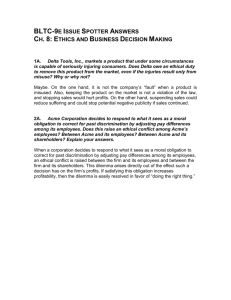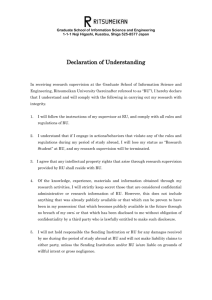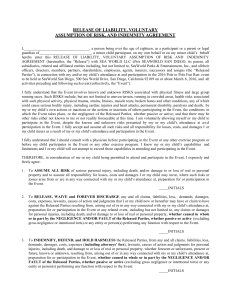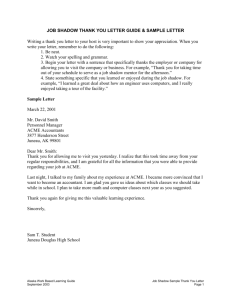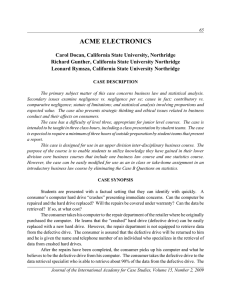Legal Based on the letters received Mr. Fontz, Mr. Gunter intends to
advertisement
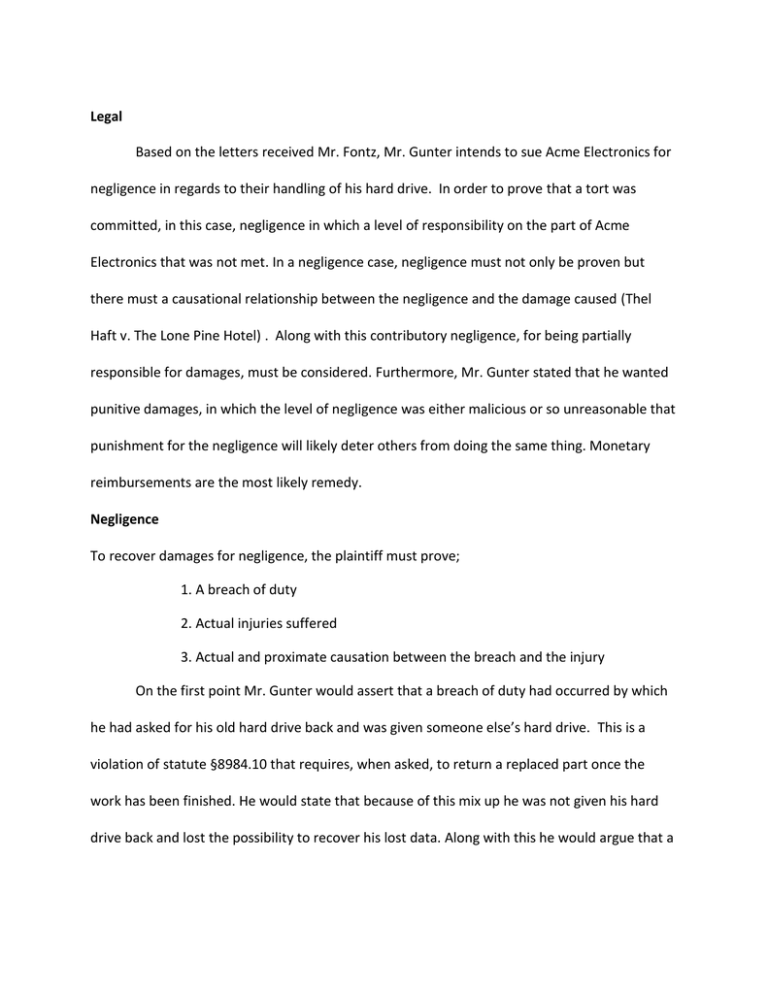
Legal Based on the letters received Mr. Fontz, Mr. Gunter intends to sue Acme Electronics for negligence in regards to their handling of his hard drive. In order to prove that a tort was committed, in this case, negligence in which a level of responsibility on the part of Acme Electronics that was not met. In a negligence case, negligence must not only be proven but there must a causational relationship between the negligence and the damage caused (Thel Haft v. The Lone Pine Hotel) . Along with this contributory negligence, for being partially responsible for damages, must be considered. Furthermore, Mr. Gunter stated that he wanted punitive damages, in which the level of negligence was either malicious or so unreasonable that punishment for the negligence will likely deter others from doing the same thing. Monetary reimbursements are the most likely remedy. Negligence To recover damages for negligence, the plaintiff must prove; 1. A breach of duty 2. Actual injuries suffered 3. Actual and proximate causation between the breach and the injury On the first point Mr. Gunter would assert that a breach of duty had occurred by which he had asked for his old hard drive back and was given someone else’s hard drive. This is a violation of statute §8984.10 that requires, when asked, to return a replaced part once the work has been finished. He would state that because of this mix up he was not given his hard drive back and lost the possibility to recover his lost data. Along with this he would argue that a reasonable person would not have mixed up the hard drives due to the known and foreseen risks of damages that could occur due to this action. Acme electronics would not dispute that the hard drive he was given was not his old one but they would argue that they have no responsibility for Mr. Gunter’s actions after he received the hard drive back. Along with this they would argue that had he backed up his hard drive there would have been no issues regarding the returned part. They would further assert that a reasonable person would do their best to not have such instances occur but in the course of business mistakes are made but are not frequent enough to constitute a breach of duty. Next, in order for Mr. Gunter to prove that there was in fact actual injuries suffered he would point out that the injuries do not need to be personal but can be purely financial. With this he would show that his damages included the $800 in order to recover the data on a hard drive that was not his, along with cost of reconstructing the lost materials of $5000 that were lost due to the misplacement. Acme Electronics would state that anything Mr. Gunter did with the hard drive after he received it was not their responsibility and that they could not be held responsible for data on the hard drive or the cost to recover the data. Lastly, Mr. Gunter would argue that there was in fact a causal relationship between him not receiving his hard drive back and the damages he incurred. He would state had he received the correct hard drive he would have been able to find out how much of the data could be recovered if any, instead of spending the $800 on Mr. Gottmilk’s hard drive. Also, he would state the value of the data, if he had been able to recover the information, would be valued at the cost to reconstruct the data which would be $5000. In order to argue this point Acme electronics would continue the argument that they could not be held responsible for the cost of recovering data after the hard drive had been returned. Furthermore, they would continue to argue that they could not be held liable for the data on the hard drive, regardless of if the data could be recovered or not. Damages If the case goes to court and Acme electronics loses there are a number of damages that can be awarded. The monetary awards that could be awarded are; compensatory damages for the loss in value of performance the plaintiff had the right to expect, which do have limits, and punitive damages. Otherwise, if they win the case there will not be any damages. In order to figure out what compensatory damages Acme Electronics may be liable for we must look at; A. Loss in Value B. Consequential Damages C. Incidental Damages The loss of value Mr. Gunter would claim would not be able to claim a loss in value because he was given the services he requested and did not have to go somewhere else to finish the transaction. He would state that the misplacement of his hard drive was an indirect cause of his loss for the recovery fee of $800 because giving Acme gave his hard drive to Mr. Gottmilk who threw it away, which is also an indirect cause for the loss of data thereby forcing him to reconstruct the data. In order for him to claim incidental damages he would have had to recover his original hard drive back, so he could seek another $800 for a data recovery attempt to that hard drive, which he was unable to do. Limitations A party is limited to the damages they can recover if; A. Losses which are purely speculative. B. Only losses which were foreseeable at the time of contracting C. Plaintiffs have a duty to mitigate damages In this case we believe that the data value of $5000 is somewhat speculative but that it is not purely speculative and an itemized account of how he came to that value would be requested. We believe that the loss of the data recovery would have been foreseeable in a computer business such as Acme Electronics, including the fact Mr. Gunter was given the number for the data recovery by an Acme Electronics employee. Also, Mr. Gunter did try to mitigate his damage by seeking out his original hard drive but it was no longer in Mr. Gottmilk’s possession, because he had thrown it away and he would argue that he was mitigating his damages by reconstructing the data at a cost of $5,000 instead of waiting for a settlement in which the further losses may occur due to the lack of that data. In the examination of punitive damages, there is a lack of evidence to support that there was any malicious or intentional misplacement of Mr. Gunter’s hard drive and that the errors occurred during the normal course of business in which for a two week period their system was overwhelmed and unable to keep track of all the parts coming in and out. Along with this, though Acme did not agree with Mr. Gunter’s requests in his letters there were no elements of mistreatment or malice. It would be very unlikely that punitive damages would be awarded if Acme electronics were to lose the case. Defenses Acme Electronics defense would consist of two arguments, contributory negligence and assumption of risk. Under the current doctrine of contributory negligence Acme would argue that Mr. Gunter was at least 1% responsible for the decision to seek the data recovery and that he was at least 1% responsible for not backing up his hard drive. Along with this Acme may claim that at least 1% would be attributed to Mr. Gottmilk because he disposed of the hard drive thereby awarding Mr. Gunter nothing. If they wait and the comparative negligence doctrine is either adopted or adopted and retroactively applied, Acme would further argue, in the case of mixed comparative negligence, that due to not backing up the information and Mr. Gottmilks contribution that they would be less than 50% responsible for the damages so he would also receive nothing. Under purely comparative negligence they would assert that these issues would put Acme at a very low percentage of fault and that the damages would be extremely reduced (Ben Dover v. Checker Taxi Company of Grace). In the issue of risk of assumption Acme would argue that Mr. Gunter assumed the risk of attempting to recover the data knowing he may not have gotten anything in return and that upon purchase of the hard drive he assumed the risk of it malfunctioning and because he decided not to back it up lost his data, therefore he would not be eligible for damages. Statistical Analysis Recommendations Based on our research we recommend that Acme settles out of court for the amount of 15,800. The main reason being that the negative publicity from taking this case to court, even if they won, may damage the name and reputation of Acme electronics much more significantly than what Mr. Gunter is asking for. Along with this we recommend admitting to the mistake and using the compensation package to make Mr. Gunter feel as though the matter was adequately resolved. Furthermore, we recommend making changes in procedures when dealing with equipment. In which a simple bar code system or Id tag is placed on the items quickly and efficiently enough so if there is a future occurrence like they experienced there will not be any misplacement of peoples parts. We also would recommend that funds be set aside in case of further complaints about misplaced property and damages associated with it, for that two week time frame, giving them a fair amount of compensation and an explanation of changes being made so that there are not future occurrences.
